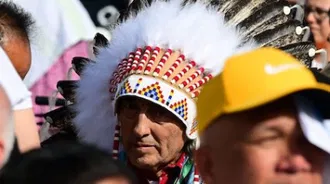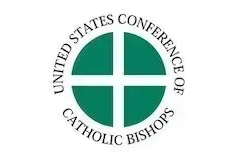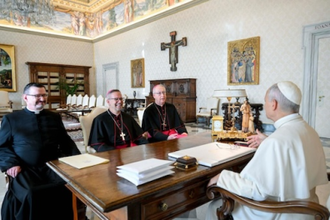Canada celebrates National Indigenous Peoples Day

Image: Vatican Media
Source: Vatican Media, CCCB
The summer solstice, June 21, marks a day dedicated to celebrating the languages, cultures, and traditions of the First Nations, Inuit, and Métis communities across Canada.
The summer solstice has deep cultural and spiritual significance for them as it signals a time of renewal, connection, and celebration.
Across Canada, celebrations offer events to showcase and dive deeper into the history and traditions of the various First Nations and Indigenous Peoples.
The Child and Youth Advocate is observing the day with a special edition of the Young Artist Program, where young people are invited to send in artwork that reflects what being Indigenous means to them.
In Montreal, the Mohawk community of Kahnawake is hosting various activities and workshops, including a fish-filleting demonstration, a bookmark-making workshop, and a free concert with Indigenous artists.
This year, 2025, is the 10th anniversary of the Truth and Reconciliation Commission of Canada's report exposing the devastating legacy of Canada's residential schools; and the sixth anniversary of the report from the National Inquiry into Missing and Murdered Indigenous Women and Girls.
When Pope Francis visited Canada in July 2022, his first public address included an apology to the representatives of Indigenous Peoples of the First Nations, the Métis, and the Inuit for the evils committed by many Christians against the Indigenous Peoples in Canada in the residential school system.
"I have come to your native lands to tell you in person of my sorrow, to implore God's forgiveness, healing and reconciliation, to express my closeness and to pray with you and for you."
Two days ahead of the National Day, the Canadian Conference of Catholic Bishops (CCCB) released a statement in French and English, encouraging people to "remember and reflect on Pope Francis' legacy and give thanks for the progress made toward reconciliation over the years".
In their statement, the Bishops stress that "Indigenous Peoples are a blessing to the Church and Canadian society." They urge everyone to open their hearts and minds to their brothers and sisters and deepen their understanding of the Indigenous Peoples, reminding Catholics that, as "members of the Church, we are called to build relationships rooted in truth, justice, and compassion."
They close by inviting everyone to continue the journey of walking together "in a spirit of hope and solidarity toward reconciliation."
In 1996, the 25th Governor General of Canada, Roméo LeBlanc declared June 21 as "National Aboriginal Day" each year. This decision came after years of consultations and statements of support by various Indigenous groups for the creation of such a day.
In 1982, the National Indian Brotherhood, now called the Assembly of First Nations, called for the creation of National Aboriginal Solidarity Day. Thirteen years later, the Sacred Assembly, a national conference of Indigenous and non-Indigenous people called for a national holiday to celebrate the work and contributions of Indigenous Peoples.
In 1995, the Royal Commission on Aboriginal Peoples suggested the creation of a National First Peoples Day. In 2017, Prime Minister Justin Trudeau announced the decision to rename the day 'National Indigenous Peoples Day.'
LINK
Canadian Conference of Catholic Bishops: www.cccb.ca/


















